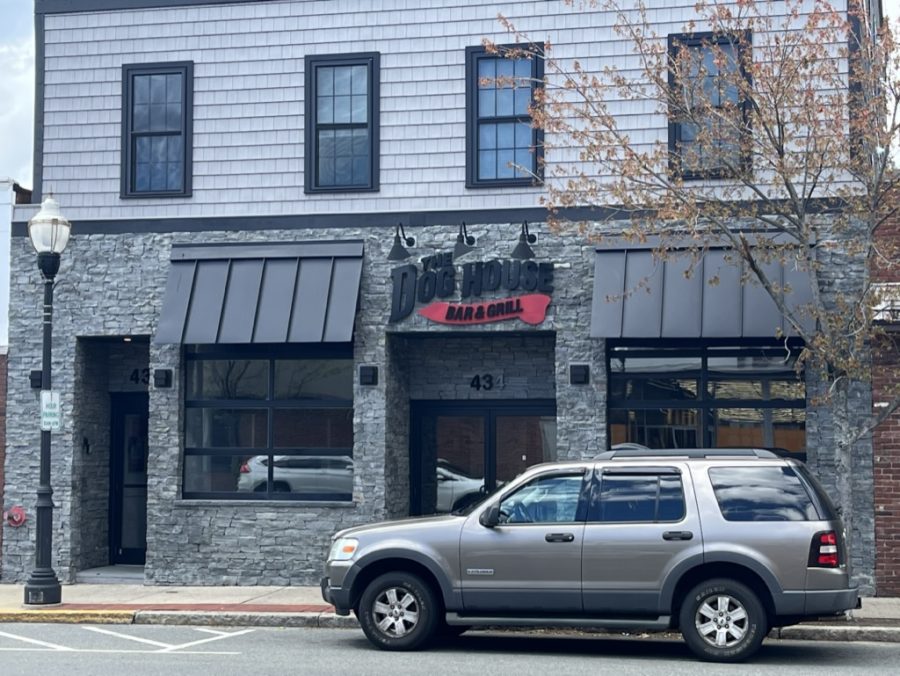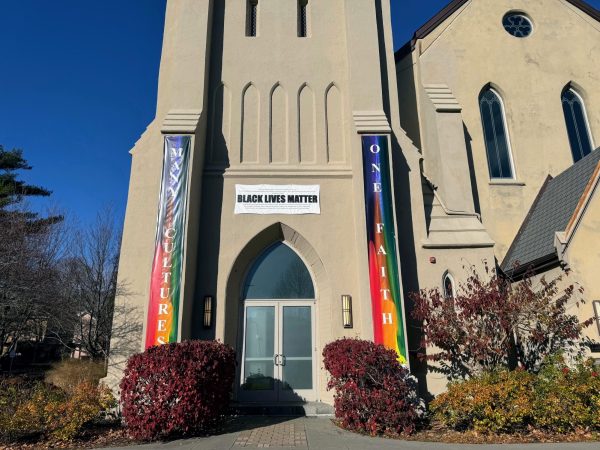Father-son duo charged with labor trafficking and forced labor in Woburn restaurants
“There’s this stereotype that exploitation is part of the American immigration experience, but the reality is that it’s abuse.”
Photo: Christina McCabe
The Dog House is one of two restaurants owned by father-son duo Jesse and Hugo Moraes, who have been charged with labor trafficking and forced labor, respectively.
The Dog House and Tudo No Braso restaurants, both owned by father-son duo Jesse and Hugo Moraes, were once staples in the tight-knit Woburn community. But following recent labor trafficking charges, that has now changed.
According to a case filed at the John Joseph Moakley Courthouse on Oct. 3, 2022, the two were charged with conspiracy to bring illegal immigrants into the country for private financial gain. An April 4 press release from the Massachusetts Attorney General’s Office stated that Jesse Moraes was charged with labor trafficking — defined as the exploitation of people for financial or personal gain — and his son was charged with forced labor. At their restaurants, employees of the Moraes men were allegedly forced to work as a way to pay off their smuggling debts, ultimately binding them to countless hours of labor for unlivable or even nonexistent wages. Paul Kelly, Hugo Moraes’ attorney, declined to comment on the allegations, and James Herbert, Jesse Moraes’ attorney, could not be reached for questioning.
“The restaurant business is ripe for exploitation,” said Elizabeth Keeley, former chief of the Human Trafficking Division at the Office of the Attorney General for Massachusetts. “But you need to be thoughtful and careful because it’s a criminal case where the penalties are high, and you need someone to corroborate a story for evidence.”
The Woburn case is an example of a common yet underreported issue: labor trafficking in restaurants. From 2007 to 2020, the U.S. National Human Trafficking Hotline received tips that resulted in 672 cases of labor trafficking in restaurants as well as 1,448 cases of labor exploitation, according to a report by anti-human trafficking organization Polaris Project. Yet it only accounts for 10% of all human trafficking cases in the U.S. reported in 2021.
However, experts say that this lower rate, compared to sex trafficking at 76%, is partially due to the challenges that come with uncovering a labor trafficking case. One major issue is the lack of law enforcement working on these cases, as only 4% of law enforcement agencies in the U.S. have a human trafficking unit. Additionally, despite the number of labor trafficking cases, there are limited ways for police and federal agencies to get involved.
“Law enforcement will not be inclined to investigate unless there is a tip,” said Donna Gavin, a lieutenant with the Boston Police Department’s Human Trafficking Unit. “Once we do get a tip, we start looking into the owner, the surveillance, a history check, knock and talks. If you don’t do anything, then you really can’t know.”
Thus, the number of unknown cases is likely much higher, with potentially thousands of victims across the nation.
The victims are oftentimes illegal immigrants, typically from Central and South American countries, Gavin said. Fear of deportation is one of the many reasons why labor trafficking goes unnoticed.
“It’s hard to even report on this when victims are scared to come forward,” said Tracie Klinke, founder and lead attorney of Klinke Immigration, an Atlanta-based firm that specializes in immigration cases. “They’re scared of not only their employers, but also the government.”
However, if victims were to come forward, they have options for protection. One is getting a U visa, which allows victims of trafficking to be able to stay in the U.S., despite not having the appropriate documents to legally remain in the country. Similarly, there is also a T visa, which varies slightly from the U visa by encapsulating more crime protection, but both were created to encourage victims to come forward.
“Unfortunately, not many people know about either,” said Candence Wills, a criminal justice professor at Northeastern University who teaches a human trafficking course. “So there are few people that take advantage of this particular program, but it is available for victims of trafficking specifically.”
Even if victims were to know about these visa options, it is not easy or simple to leave a labor trafficking situation, as they likely face threats and abuse by their employers. Oftentimes, there is also a language barrier between the victims and law enforcement, which deters victims from coming forward.
“A person might feel intimidated or threatened when there is a language barrier,” Keeley said. “Sometimes [victims] don’t know where they are and how to even find law enforcement, or they feel like they cannot trust law enforcement. So it’s like sometimes the devil you know is safer than the devil you don’t know.”
In another case, abusive labor trafficking was reported on March 16 at Stash’s Pizza in Dorchester. The owner of the pizza shop, Stavros Papentoniadis, was arrested for allegedly forcing his employees to work for minimal wages, all the while abusing them and threatening to deport them if they tried to quit, according to a press release from the Attorney General’s office.
To date, both restaurants remained open shortly after their owners’ arrests. However, the effects are still lasting. Before the trafficking allegations, the Dog House would be alive with a busy lunch rush. But around lunchtime on Saturday April 8, every seat was vacant at the restaurant, which is nestled in the middle of a strip of local businesses on Main Street in Woburn.. Even during dinnertime, the restaurant never saw more than a handful of customers. Employees at the Dog House declined to comment on the allegations.
Eddie Doherty, a firefighter in Woburn who frequents The Dog House, said he had trouble believing the news about the allegations.
“It just seemed like your everyday bar,” Doherty said. “I’ve known the owner for 15 years, and I know he’s not like that. He’s a family guy, there’s no way he could’ve done something like this.”
But experts say this kind of abuse, tucked behind walls inside restaurant kitchens, is often hard to spot, as law enforcement and bystanders assume hardworking employees are doing their job and getting paid for their work.
“We have this idea that people being exploited [is] okay,” said Amy Farrell, a criminal justice and criminology professor at Northeastern University. “There’s this stereotype that exploitation is part of the American immigration experience, but the reality is that it’s abuse.”
For victims of labor trafficking, there are resources available, mostly from nonprofits that offer shelter and food. However, due to dwindling budgets and small numbers of staff, these services are limited.
“Our biggest threat is underfunding,” said Brianna Rachinni, executive director for the Triad Ladder of Hope organization, a nonprofit based in High Point, North Carolina. “Clients need relocation services, but those are really costly.”
This is true on the state level as well, as there is a lack of funding for the Department of Labor, Farrell said. While there are restaurant inspectors, their primary goal is to check the conditions of the food and make sure that the conditions are up to code.
“Almost every restaurant has an inspector, but we don’t know if they are actually screening for trafficking,” Farrell said. “The inspectors have a fear that if they ask too many questions about the workers, then they may not get to their goal of checking the food.”
Despite these financial hardships, Rachinni said that there are still ways to spread awareness, including prevention education for youth and sharing the human trafficking hotline number.
Overall, police investigation strategies for human trafficking cases are not yet optimized for noticing the signs of labor trafficking, Farrell said after researching for years for the National Institute of Justice. In fact, she found that their strategies are most tailored toward signs of sex trafficking instead. While she hopes for this issue to be more thoroughly investigated in the future like other forms of trafficking, the chances are slim.
“Selling sex is always illegal, restaurants aren’t,” Farrell said. “There are no restaurants that have plaques that say, ‘We are a humanely-run restaurant.’ We just don’t have good ways to know.”












